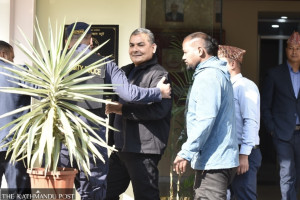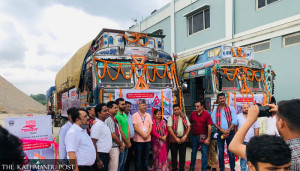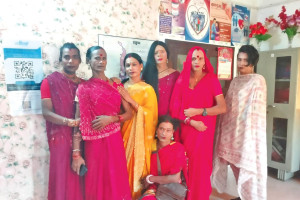National
Experts call for action, legal reforms to address gender-based violence
An event marking the 16 Days of Activism against GBV brings together stakeholders to discuss ways forward for curbing violence against women.
Post Report
An interaction event titled ‘Empower, Educate, Enforce’ was held at Thames International College in Kathmandu on Monday to mark the start of the 33rd International 16 Days of Activism against Gender-Based Violence (GBV).
Astitwa Nepal, an organisation working in the area of acid and burn violence (ABV), organised the event in collaboration with Thames International College, Kadambari College, and National College. Supported by the US Embassy in Nepal, the event revolved around the systemic issues surrounding GBV and discussed the practical approaches to addressing it.
Gender-based violence remains a pressing problem globally. As many as 85,000 women and girls were intentionally killed around the world last year, of which 51,100—or 60 percent—were killed by their intimate partners or family members, according to the report ‘Femicides in 2023: Global Estimates of Intimate Partner/Family Member Femicides’ published by UN Women and United Nations Office on Drugs and Crime.
This means an average of 140 women and girls die every day at the hands of someone close to them—one every 10 minutes.
Nepal, despite its legal framework addressing violence against women, ranks 71 out of 190 economies in the World Bank’s Women, Business, and the Law Safety Indicator. With 51.1 percent of its population being female, this statistic spotlights the gaps in ensuring women’s safety and equality in the country.
The first panel at the event, ‘Beyond Awareness: Practical Approaches to Gender-Based Violence’, featured Binu Thapa from the National Federation of Disabled-Nepal, Sulakshana Rana of Saathi, and Jenny Khadka, a burn patient counselor at Kirtipur Hospital. The three discussed ways to bridge the gap between awareness and action.
Rana emphasised the importance of legal and financial aid for survivors. “Many don’t have the financial resources to hire a lawyer or even step out of their homes to file a complaint,” she said. “Economic independence is crucial for survivors to overcome these hurdles.”
Rana’s concerns are validated by the Nepal Demographic and Health Survey 2022, which found that 58 percent of women who experienced physical and sexual violence neither sought help nor told anyone.
Among the few who did, 62 percent turned to family, which shows societal reliance on informal support systems over institutional mechanisms.
The second panel, ‘Empowering Justice: Legal Perspectives on Preventing GBV’, featured lawyer Sushma Gautam of the Forum for Women Law and Development, DSP Saileshwori Bohora of the Women and Children Service Directorate, and politician-educator Manushi Yami Bhattarai.
Their discussion pointed out critical gaps in Nepal’s legal and enforcement systems.
Bhattarai related an incident from her time at Tribhuvan University when she was stalked by three men. She faced challenges in reporting such cases due to the lack of an appropriate legal approach for ‘stalking’.
“My father was the prime minister then and one of the stalkers even reached the PM residence,” she said. “Stigma and power dynamics often prevent survivors from approaching the police. Policies alone are not enough.”
She further pointed out the role of the media in perpetuating stigma. “Media also needs to be sensitised on gender-based violence issues,” she said. “When I faced stalking, some media outlets framed it as—‘Can ordinary citizens no longer express their feelings of love, just because she is the prime minister’s daughter?’”
Pointing that GBV stems from power dynamics rather than gender alone, she said, “We need to include all genders, including LGBTQIA+ individuals, in this conversation.”
According to Gautam, the laws are predominantly designed for women as victims and men as perpetrators. For adult men or members of the LGBTQIA+ community, there are no clear provisions.
“Police often judge cases based on biological appearances rather than gender identity,” said lawyer Gautam, specifying the need for an inclusive legal framework.
Gautam also underlined the necessity of ongoing legal reviews, noting that while the laws may appear adequate on paper, practical implementation often reveals loopholes. She added that regular evaluations of laws and frameworks are necessary to ensure justice for all survivors.
While international agreements like the Convention on the Elimination of All Forms of Discrimination Against Women (CEDAW) and treaties like Istanbul Convetion and Beijing Declaration offer a robust policy foundation, underreporting remains a significant barrier, according to DSP Bohora.
“When cases go unreported, the police cannot act,” Bohora said. “Fear of social stigma, victim-blaming, and family pressure often silence survivors.”
Reinforcing the need for survivor protection, she pointed out the scarcity of shelter houses and safe spaces, which discourages survivors from filing complaints.
“The government must ensure survivors’ safety from the moment they approach the police until court proceedings are concluded,” Bohora said. “Without this, fear will always get the better of survivors.”
Bohora also called for the government to conduct a survivor-based research survey. “This would help the police force understand better ways to follow up on cases, because just gender-responsive training is not enough,” she said. “We need to understand more of the survivors’ perspectives.”
While Nepal has made strides towards curbing GBV with laws such as the Domestic Violence (Offense and Punishment) Act, 2009, and the Muluki Criminal Code, 2017, implementation gaps persist.
According to the Nepal Demographic and Health Survey 2022, only 28 percent of women experiencing violence sought help, which shows the need for systemic reforms.
Erica Alon Alexander, cultural affairs officer at the US Embassy Nepal, said that it is crucial to have these dialogues about GBV. “But even more important,” she said, “is turning these conversations into actions to move the needle forward on social change and justice.”




 20.12°C Kathmandu
20.12°C Kathmandu













